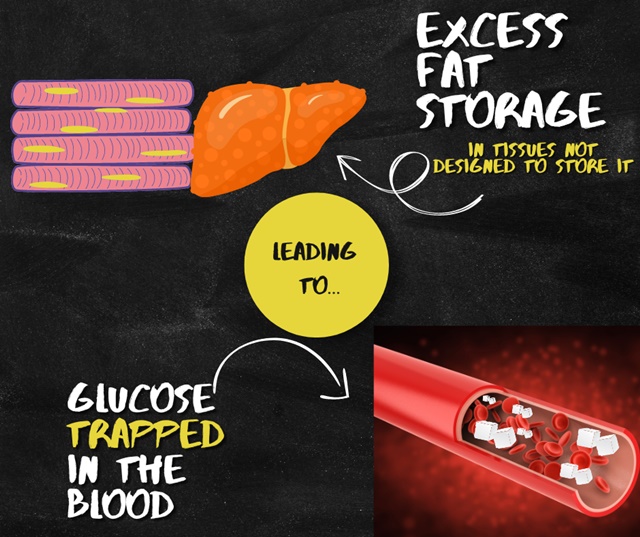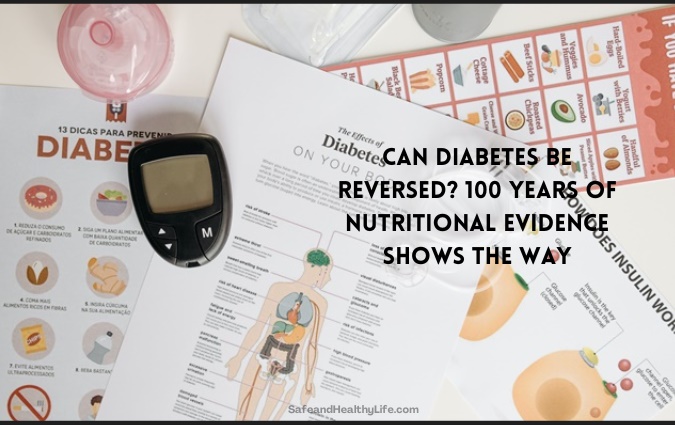A Growing Pandemic
Diabetes is one of the fastest-growing health crises of the century. According to CDC statistics, 37.3 million people have diabetes (11.3% of the US population). Another 8.5 million people (23.0% of adults) are undiagnosed. {1} That means one in four people have diabetes and don’t even know it!
The World Health Organization presents some sobering statistics. There are 422 million diabetics worldwide, steadily increasing in the past few decades {2}. The financial burden of diabetes is also huge, last estimated at $325 billion dollars. {3}
Are We Fighting a Losing Battle?
Despite our best efforts in dietary education and medication management, disease rates continue to rise.
What are we missing?
Could it be that we have been approaching this complex condition the wrong way?
All this time we have been using a carbohydrate-centered model for treating diabetes. We emphasize decreasing sugar intake. And it makes sense on the surface. Diabetes Mellitus literally means “Honey-sweet”, “Pass Through”.
The body struggles to metabolize the carbohydrates (sugar) in our diet. As a result, sugar elevates in our blood to toxic levels. It is then “passed through” the urine. It’s easy to think sugar is to blame.
But to cure any disease, we must first know its cause.
The True Cause of Diabetes – A High Fat Diet

An examination of over 100 years of nutritional evidence points to a different culprit. The culprit is not sugar but fat. A diet high in fat may be the true cause of type 2 diabetes and thus the key to its reversal.
There are hundreds of studies to support this fact. But we’ll dive into just 4 studies, going back to the 1920s to today. Evidence-based nutrition points to a diet low in fat as the key to diabetes reversal. And this news is far from new!
Exhibit A
1927, High-Fat vs High Carb diet in Glucose Testing {4}
A group of young, healthy, male medical students were randomly split and placed on a specific diet for 2 days. The high-protein group only ate lean meat and egg whites. The high-fat group ate olive oil, butter, mayonnaise, and cream. The high-carb group was limited to white sugar, candy, pastries, white bread, potatoes, syrups, bananas, rice, and oatmeal. On the third day, each group drank a concentrated glucose solution (a glucose challenge).
The results were astounding!
Measurements took place at 30, 60, and 120-minute intervals. The blood glucose of every person in the high-fat group remained greater than 140 mg/dL (normal is 80-140 mg/dL) after 120 minutes. The high-protein group experienced elevations, but not as high as the high-fat group.
Finally, the high-carb group experienced the best blood glucose levels, all remaining within 80-140 mg/dL after 120 minutes.
What does this mean?
A diet high in fat, not carbs, will lead us to struggle to metabolize sugar.
Exhibit B {5}
1955, 80 Diabetic Patients on Low Fat Diets

80 insulin-dependent diabetics were placed on a low-fat, high-carb diet. The diet consisted of 20 to 30 grams of fat and 120 to 150 grams of protein. Their remaining calories came from carb-rich sources, foods diabetics are typically told to avoid.
Again the results were dumbfounding. After three to six weeks, 63% of the patients became non-diabetic. After eighteen weeks this number increased to 80%.
Exhibit C {6}
1958, Dr. Kempner’s Rice Fruit diet
In an attempt to reverse hypertension, Dr. Kemper placed his patients on a diet of rice and fruit. In the process, something amazing happened. Those who had diabetes while eating this diet, naturally low in fat, experienced a reversal of their diabetes.
Conventional wisdom states a diet of pure carbohydrate energy should worsen diabetes. But in fact, the opposite occurred.
Exhibit D {7}
2008, Dr. Neal Barnard Low-Fat Vegan Diet Vs Conventional Diabetic Diet

This study placed a low-fat vegan diet head to head with a conventional diabetic diet, low in carbs. Participants were followed for 74 weeks. Those in the low-fat group experienced greater reductions in their A1C, compared to those following American Diabetes Association guidelines.
And Many More…
These are just a few of many experimental studies exposing the missing link to this pandemic-sized chain of diabetes. Addressing the fat content of our diets may be the key to turning things around.
One of the largest nutritional studies, the EPIC study{8} (European Prospective Investigation into Cancer and Nutrition) strongly solidifies this connection. It involved 500,000 participants and 12 years of data.
The research was clear: replacing 5% of saturated fat with fructose (from fruit or refined sources) reduces the risk of diabetes by 30%! Even small steps in the right direction can go a long way.
A Personal Note
If we ever expect to see a decline in diabetes rates the fat connection cannot be ignored. It’s high time we embrace and spread the truth. A low-fat diet rich in wholesome carbs can lead to diabetes reversal.
I have personally experienced this with my wife. She suffered from diabetes for 8 years. After just 6 weeks of a low-fat whole food plant-based diet, she was completely off medication!
We cannot afford to close our eyes to facts. Especially when this truth can extend the lives of millions for generations to come.
About The Author:
Lewis Bertus, PA-C: Even Before I started my Physician Associate career in 2017, teaching the power of healthy lifestyle choices has always been my passion. After seeing hundreds of patients (my wife included) suffer the many complications of diabetes, I understood medications can only go so far. I have also seen many patients (my wife included) unlock the power of healthy lifestyle choices to reverse this debilitating disease. It is my lifelong goal to coach anyone suffering from diabetes (type 2, or pre-diabetes) to find the freedom and longevity that comes from reversing this illness for good.
———————————————————————————–
Study/Citation Links:
(1) https://www.cdc.gov/diabetes/library/reports/reportcard.html
(2) https://diabetes.org/about-us/statistics/cost-diabetes
(3) https://www.who.int/health-topics/diabetes#tab=tab_1
(4) J. Shirley Sweeney, “Dietary Factors That Influence the Dextrose Tolerance Test: A Preliminary Study.” Archives of Internal Medicine 40, no. 6 (December 1, 1927): 818–30. https://jamanetwork.com/journals/jamainternalmedicine/article-abstract/535594.
(5) I. Singh, “Low-Fat Diet and Therapeutic Doses of Insulin in Diabetes Mellitus.” The Lancet 268, no. 6861 (February 26, 1955): 422–25. https://www.thelancet.com/journals/lancet/article/PIIS0140-6736(55)90211-7/fulltext.
(6) W. Kempner, R. L. Peschel, and C. Schlayer, “Effect of Rice Diet on Diabetes Mellitus Associated with Vascular Disease.” Postgraduate Medicine 24, no. 4 (October 1958. https://www.tandfonline.com/doi/abs/10.1080/00325481.1958.11692236
(7) Neal D. Barnard et al., “A Low-Fat Vegan Diet Improves Glycemic Control and Cardiovascular Risk Factors in a Randomized Clinical Trial in Individuals with Type 2 Diabetes.” Diabetes Care 29, no. 8 (August 1, 2006): 1777–83. https://diabetesjournals.org/care/article/29/8/1777/28693/A-Low-Fat-Vegan-Diet-Improves-Glycemic-Control-and
(8) InterAct Consortium, “Association Between Dietary Meat Consumption and Incident Type 2 Diabetes: The EPIC-InterAct Study.” Diabetologia 56, no. 1 (January 2013): 47–59. https://link.springer.com/article/10.1007/s00125-012-2718-7.
Those living with type 1 diabetes can learn to lower their insulin needs and live life to the fullest!





